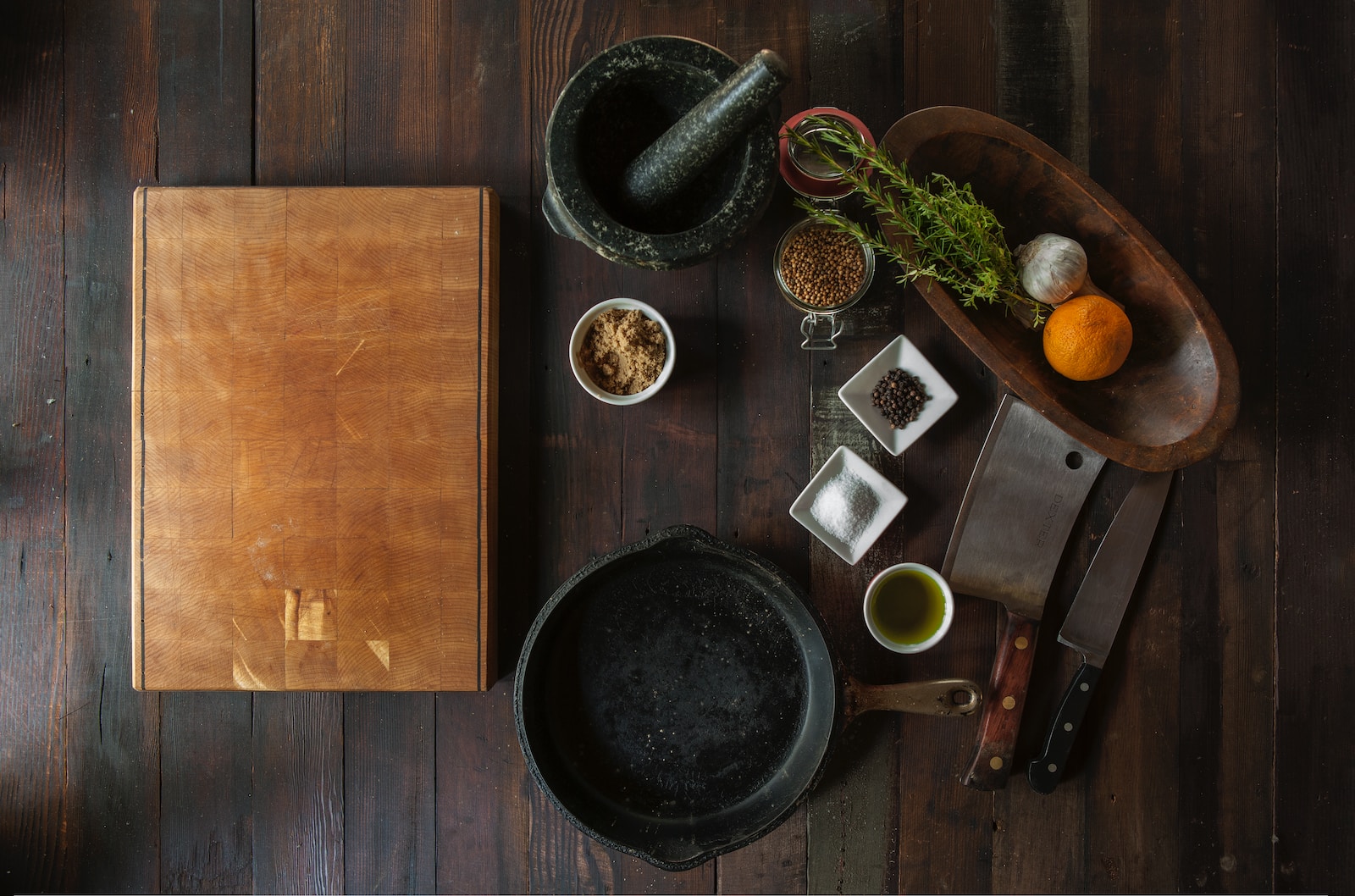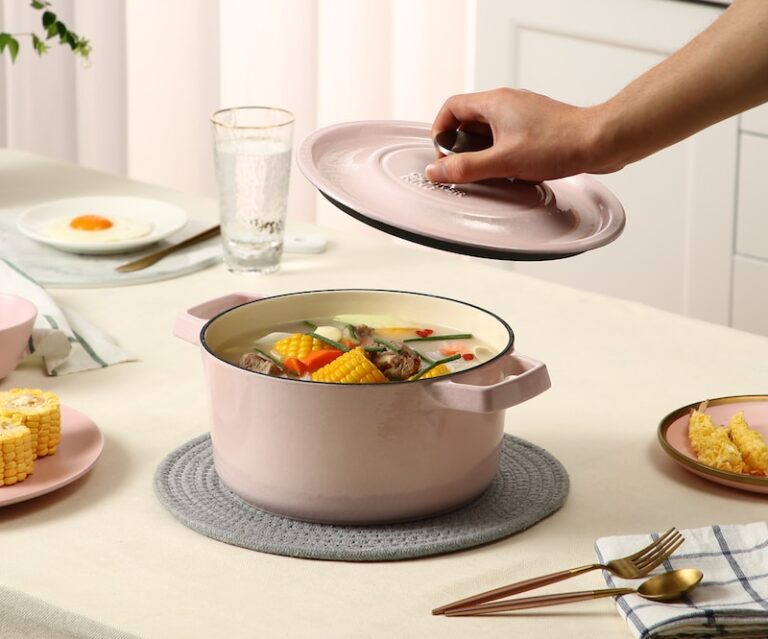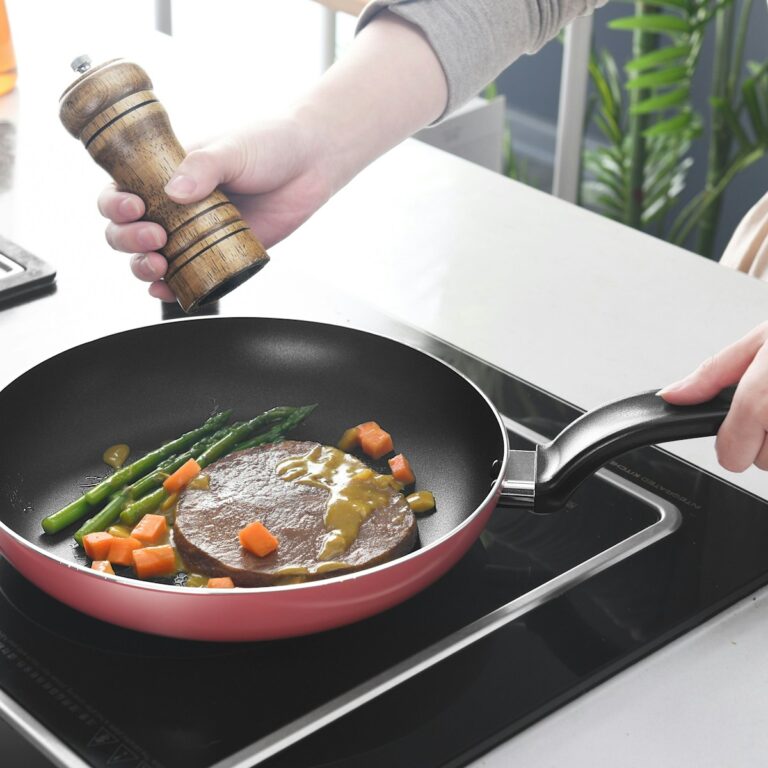You’re all set to cook a mouthwatering meal in your beloved cast iron pan, but as you lift the lid, an off-putting smell hits you. It’s not the delightful aroma you were expecting.
Odors from cast iron pans and dutch ovens can be a real buzzkill, and you might wonder what’s causing this olfactory disturbance.
But fear not! Understanding these odors is the key to unlocking the secrets of your cookware’s health and ensuring a delicious culinary adventure.
Toxicity: Unraveling the Hidden Dangers
That rancid, chemical, or fishy smell from your pan may be more than just a nuisance; it could be a subtle warning of potential toxicity. Yes, you read that right!
Odors are like tiny messengers, and they might be signaling the presence of harmful substances in your cookware. When your cast iron pan smells like rancid oil or fish, it means that minuscule molecules of these substances have latched onto the pan’s surface.
And guess what? Those little troublemakers can sneak into your nose when you catch a whiff. It’s like inhaling a microscopic version of the odor-causing substance.
Cooking with smelly cookware isn’t just a matter of a bad taste lingering in your mouth; it can lead to stomach upsets and even potentially harbor those pesky disease-causing organisms that we’d rather not deal with.
Contamination: The Whiff that Spoils the Flavor
Your pan may be whispering secrets to your food – secrets it shouldn’t be telling. When your cast iron cookware emits odors, those scents can permeate the very essence of your culinary creations.
Picture this scenario: you cook a beautiful chicken dish in a pan that smells like fish. What do you get? A strange fusion that we’ll affectionately call “ChickenFish” – and let’s face it, that’s not a combination we’re eager to try.
The truth is, the odors from your pan can contaminate the taste and aroma of your food, impacting the dining experience in unexpected ways. We all want our dishes to sing with the perfect harmony of flavors, not end up in a symphony of culinary confusion.
Listen to What Your Pan is Saying
Okay, so your pan isn’t a fortune teller, but it’s trying to tell you something. Persistent odors might be more than just a simple quirk; they could be a plea for some TLC. When your cast iron pan starts emitting unpleasant smells, it’s like a red flag waving in your kitchen – a gentle nudge to take care of your trusty cookware.
Just like anything else we cherish, our cast iron pans need a little love and attention. Proper care and maintenance can banish those lingering odors, leaving you with a clean slate for your culinary escapades.
| Smell | Potential Causes | Solutions |
|---|---|---|
| Rancid Oil | Insufficient seasoning during cooking or storage | Heat treatment, proper seasoning, cleaning process |
| Metallic | Compromised seasoning due to acidic foods | Stripping and reseasoning, avoiding acidic foods |
| Fishy | Absorption of strong odors from cooking fish | Heat treatment, salt scrub, reseasoning |
| Chemical | Exposure to impurities or improper seasoning | Deep cleaning, reseasoning, baking soda scrub |
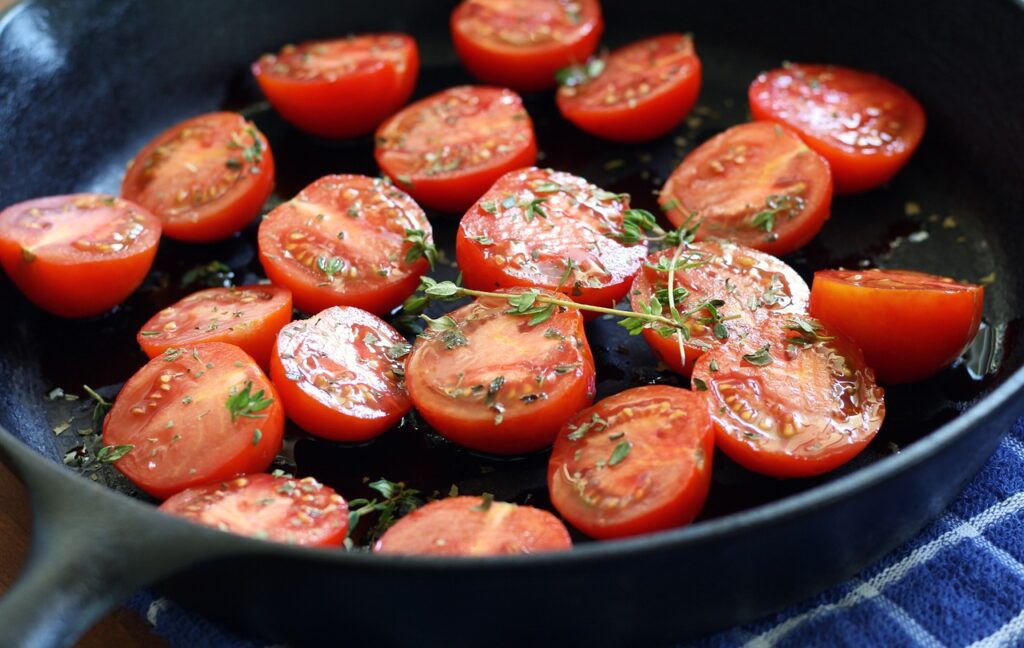
Cast Iron Smells like Rancid Oil
When the scent of rancid oil emanates from your beloved cast iron pan, it can be disheartening. Understanding the reasons behind this smell and how to address it is essential for maintaining the quality and safety of your cookware. Let’s explore the process of rancidification, the differences between seasoning and applied oil, and effective methods to clean and refresh your rancid cast iron pan or dutch oven.
Understanding Rancidification in Cast Iron Pans
Rancidification occurs when the fats or oils present in the cast iron pan react with oxygen in the air, leading to the development of off-putting odors and flavors. Exposure to air, moisture, light, and even certain bacteria can accelerate this process. When your cast iron pan goes rancid, the resulting smell can be so unpleasant that some liken it to the smell of death.
Distinguishing Between Seasoning and Applied Oil
It’s important to differentiate between the seasoning and the oil applied on top of the cast iron pan. Properly seasoned cast iron pans and dutch ovens undergo a molecular change called polymerization, where the oil transforms into a durable non-stick coating that adheres to the pan’s surface. This seasoning process does not lead to rancidification.
However, the oil applied on top of the pan before storing it can indeed go rancid, particularly animal fats like lard, which tend to spoil faster than vegetable oils. If this oil goes rancid, it can negatively impact the taste of your food and even cause stomach upsets if bacteria were involved in the rancidification process.
Importance of Proper Seasoning
When a cast iron pan goes rancid, it indicates that the pan was not adequately seasoned. Proper seasoning involves heating the pan at high temperatures for a sufficient duration to ensure the oil polymerizes, creating a protective and durable layer. If the pan goes rancid, it signifies that the seasoning process was insufficient, and the oil did not fully polymerize.

Cleaning a Rancid Cast Iron Pan
Fortunately, you can restore your rancid cast iron pan to its former glory with a simple cleaning process. Here’s what you need:
- 1 cup of vinegar
- Water
Step-by-Step Cleaning Process:
- Place the rancid cast iron pan on the stove.
- Pour a cup of vinegar into the pan, ensuring it covers the bottom.
- Fill the pan with water until it reaches a suitable level.
- Heat the pan and its contents, bringing the water and vinegar to a boil.
- As the pan heats up, you will notice the rancid oil floating to the surface.
- Carefully pour out the water and vinegar mixture and thoroughly rinse the pan.
Your Refreshed Cast Iron Pan
With the rancid oil removed and the pan cleaned, your cast iron pan or dutch oven is now ready for use. There’s no need to reseason it at this point since you only removed the applied oil that had gone rancid.
Preventing Future Rancidity
To avoid encountering rancid smells in your cast iron cookware:
- Properly season your cast iron pans and dutch ovens using suitable oils.
- Avoid using animal fats like lard as the applied oil before storage.
- Regularly clean your cast iron cookware with mild detergent and warm water, ensuring it is thoroughly dry after each use.
- Store your cast iron pans in a cool, dry place to prevent exposure to excess moisture and air.
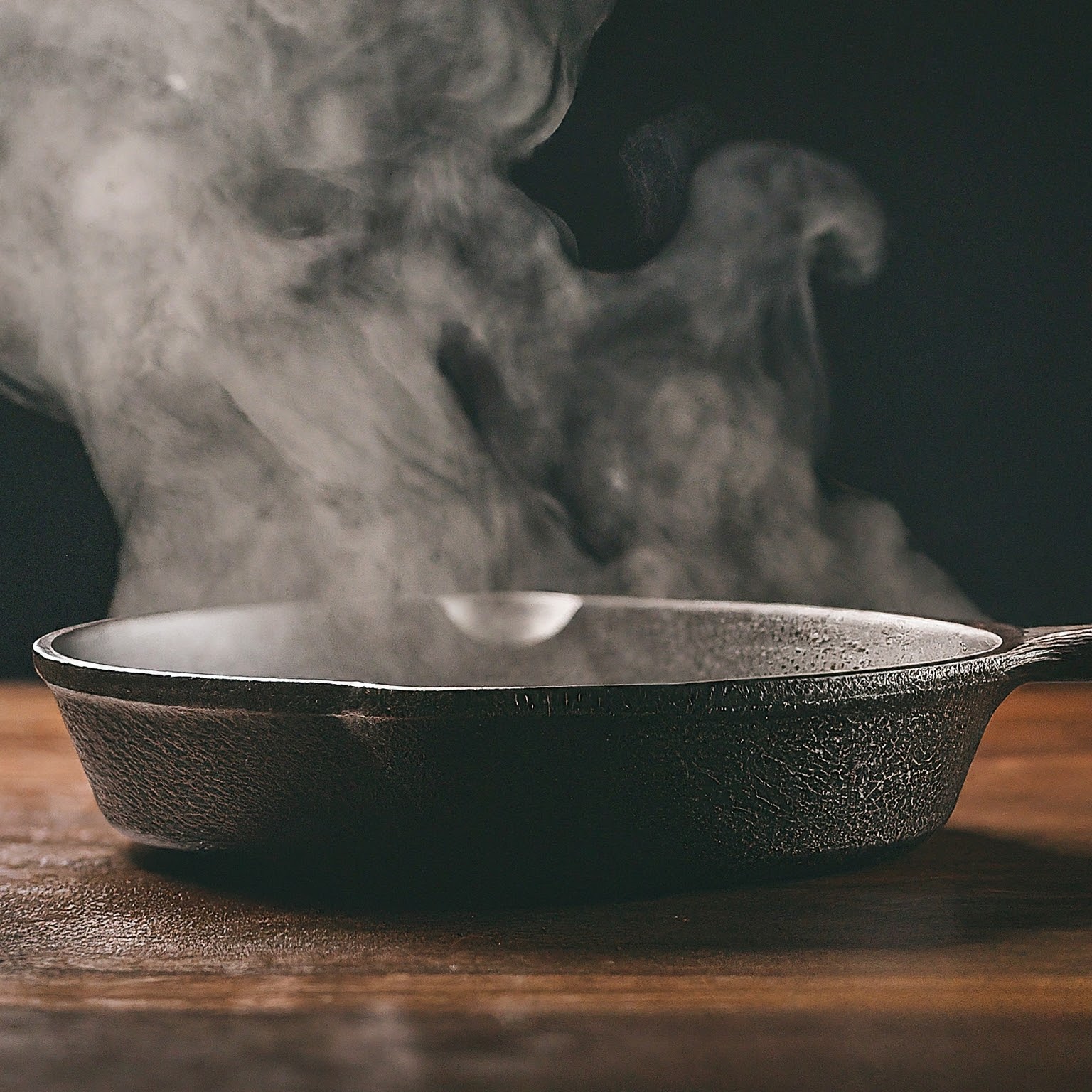
Cast iron smells like metal
While cooking with cast iron pans is a delightful experience, encountering metallic smells and tastes can be disappointing and puzzling. Fear not! We’re here to help you understand the root cause and offer effective solutions to ensure your cast iron cookware is in top-notch condition.
Understanding the Metallic Smell Dilemma.
If you notice your cast iron pan smells like metal and the food cooked in it tastes metallic, it indicates that the pan’s seasoning has been compromised. Seasoning refers to the layer of polymerized oil that creates a non-stick surface and imparts a rich, dark color to the cookware. When seasoning is stripped off or not adequately maintained, the pan becomes susceptible to absorbing metallic flavors.
Culprits of Metallic Tastes
Acidic foods, such as tomatoes, tomato-based sauces, wine, vinegar, and other foods with high acidity, can be harsh on cast iron cookware. The acid reacts with the pan’s surface, breaking down the seasoning and leading to a metallic taste in your dishes.
Rescue Plan: Stripping and Reseasoning
To bring your cast iron cookware back to its former glory and eliminate metallic smells and tastes, follow these steps:
- Strip Off the Old Seasoning: Use a scrubber or steel wool to remove the existing seasoning from the pan’s surface. This process will eliminate any trapped metallic flavors and residues.
- Clean Thoroughly: After stripping the seasoning, wash the pan thoroughly with warm water and a mild detergent to remove any remaining debris and impurities.
- Dry Completely: Ensure the pan is completely dry before proceeding with the reseasoning process. Moisture can lead to rust, which can exacerbate metallic smells and affect the pan’s performance.
- Reseasoning – The Key to Success: Apply a thin layer of suitable oil, such as vegetable oil or flaxseed oil, to the pan’s surface. Ensure to cover the entire pan, inside and out, with the oil. Next, place the pan upside-down in a preheated oven at a high temperature, usually around 400-500 degrees Fahrenheit. Allow it to bake for about an hour. The heat will polymerize the oil, creating a new, protective seasoning layer that resists metallic tastes and enhances the non-stick properties.
Preventing Metallic Issues in the Future
To maintain the integrity of your cast iron cookware and prevent metallic smells and tastes:
- Avoid cooking highly acidic foods in your cast iron pan.
- Be vigilant in properly seasoning and maintaining your cookware regularly.
- Always dry your pan thoroughly after washing to prevent rust.
- Consider designating specific pans for acidic and non-acidic cooking to avoid cross-contamination.
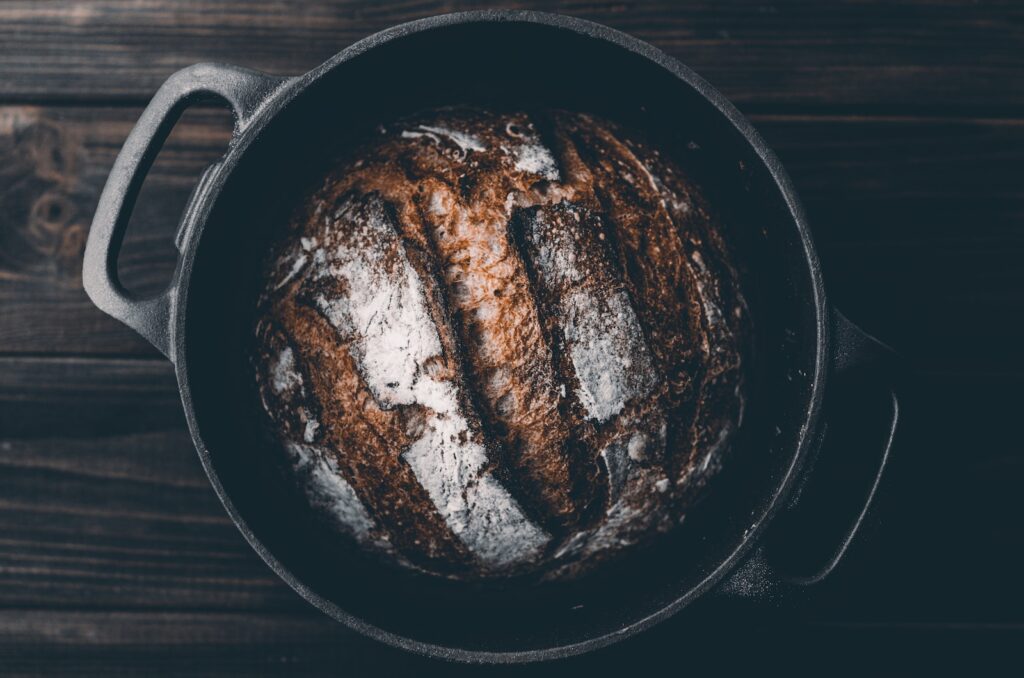
Cast iron smells like fish
Cooking fish in cast iron cookware is a delight for seafood enthusiasts, but it can leave a lingering fishy smell that affects subsequent meals. If you find yourself dealing with this issue, don’t worry; we’ve got you covered! Let’s explore effective methods to eliminate fishy smells and other pungent odors from your beloved cast iron pans and dutch ovens.

Understanding the Fishy Smell Dilemma
Cooking fish or other pungent foods in cast iron pans can lead to the absorption of strong odors by the porous surface of the cookware. The smell may persist even after regular washing, making it challenging to cook other dishes without the unwanted aroma.
Practical Solutions to Remove Fishy Smells
- Heat Treatment: One of the simplest methods to get rid of lingering odors is through heat treatment. Preheat your oven to around 400 degrees Fahrenheit and place the cast iron pan inside for approximately 30 minutes. This process, recommended by Lodge Cast Iron, helps neutralize odors without stripping off the seasoning.
- Salt Scrub: A natural deodorizer, salt can work wonders in eliminating stubborn smells. After washing your pan, sprinkle a generous amount of table salt on the surface. Allow it to sit overnight, enabling the salt to absorb the unwanted odors. The next morning, rinse off the salt, and your pan should smell as good as new.
- Seasoning Refresh: If the heat treatment and salt scrub fail to completely remove the fishy smell, consider re-seasoning the pan. While this might seem like a more involved process, it can be highly effective. Begin by stripping off the existing seasoning from the pan, using a scrubber or steel wool to remove any residues. Once the pan is clean, apply a new layer of seasoning by coating it with a thin layer of suitable oil and baking it in the oven. Properly seasoned cast iron will not only resist odors but also enhance its non-stick properties.
Preventing Future Odor Issues
To avoid fishy smells and other food odors from becoming persistent problems:
- Reserve specific cast iron cookware for cooking fish and strong-smelling foods.
- Consider using a splatter guard or lid while cooking fish to minimize the dispersion of odors.
- Always wash your cast iron pan thoroughly after each use to remove any lingering food particles and smells.
- Regularly re-season your cast iron cookware to maintain its integrity and ensure a fresh cooking surface.
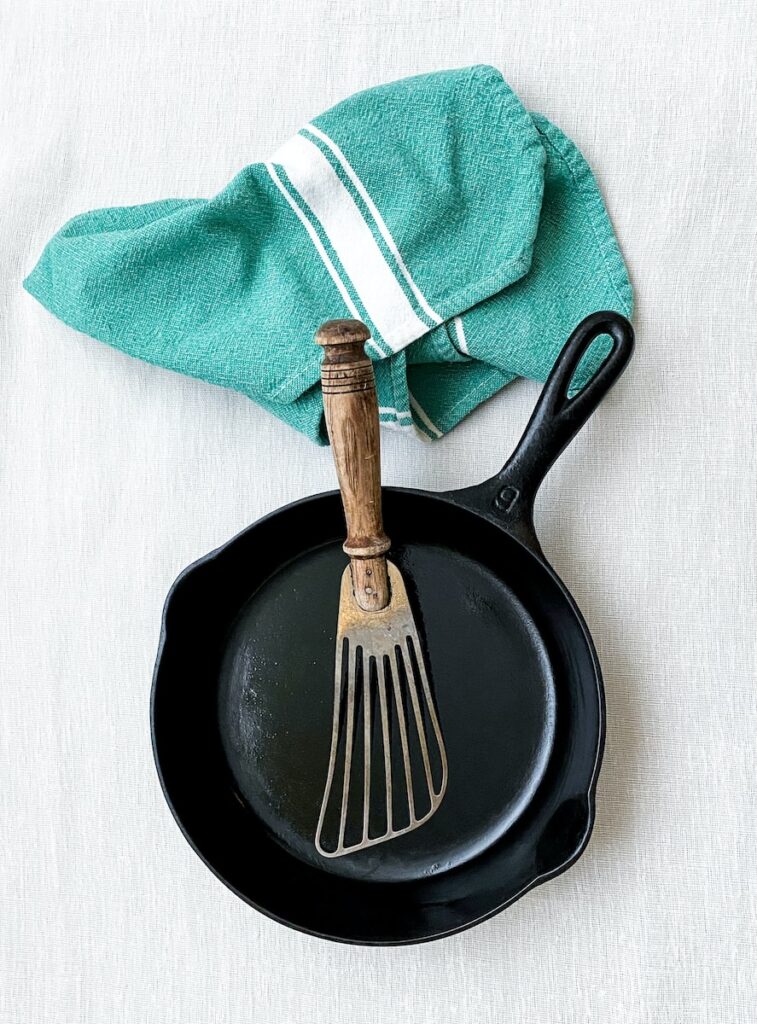
Cast iron smells like chemicals
When your cast iron pan emits a smell resembling chemicals, it can be a cause for concern. This odor might be a result of impurities in the pan or improper seasoning. Ensuring the safety and functionality of your cookware is paramount, and addressing this issue promptly is crucial.
Potential Causes of Chemical Odors
- Impurities in the Pan: If your cast iron pan has been exposed to certain chemicals or substances, such as cleaning agents or oils with additives, it could lead to a lingering chemical smell. In some cases, the pan might have come into contact with non-food-safe materials.
- Residue from Seasoning: During the seasoning process, which involves applying layers of oil to create a non-stick surface, certain oils may leave a distinct odor when heated. If the seasoning was not properly done or if unsuitable oils were used, it could lead to chemical-like smells.
Addressing the Chemical Smell
Resolving a chemical odor in your cast iron pan requires a systematic approach to ensure the pan’s safety and preserve its cooking capabilities.
- Identify the Source: First, identify any potential sources of the chemical smell. Review your recent usage and cleaning practices to determine if any non-food-safe materials or substances might have come into contact with the pan.
- Deep Cleaning: Thoroughly clean the pan to remove any impurities or residues that might be causing the smell. Avoid using harsh chemical cleaners, as they might worsen the problem. Instead, opt for a gentle scrub using warm water and a mild detergent.
- Re-Season the Pan: After cleaning, it’s essential to re-season the pan properly. This process involves applying a layer of suitable oil and baking it in the oven to create a protective non-stick coating. Choose oils with high smoke points, such as vegetable oil or flaxseed oil, for the best results.
- Baking Soda Scrub: If the chemical smell persists, consider using a baking soda scrub. Mix baking soda with water to create a paste, apply it to the pan, and gently scrub the surface. Baking soda is a natural deodorizer and can help neutralize odors.
- Heat Treatment: Another effective method to eliminate chemical smells is a high-heat treatment. Heat the pan in the oven at a temperature of around 500 degrees Fahrenheit for an hour. This process can help burn off any remaining residues and odors.
- Patience and Ventilation: In some cases, the chemical smell might dissipate over time with regular use and proper ventilation during cooking. Ensure your kitchen is well-ventilated to help disperse any lingering odors.
Preventing Future Chemical Smells
To prevent chemical smells from recurring in your cast iron pan:
- Use only food-safe oils for seasoning and cooking.
- Avoid using harsh chemical cleaners or abrasive scrubbers.
- Be mindful of the materials and substances that come into contact with the pan during cleaning and storage.
- Regularly season and maintain your cast iron pan to keep it in top condition.
| Smell | Preventive Measures |
|---|---|
| Rancid Oil | Proper seasoning, avoid using animal fats as applied oil |
| Metallic | Avoid cooking highly acidic foods, regular seasoning |
| Fishy | Reserve specific cookware for fish, use lids when cooking fish, regular cleaning |
| Chemical | Use food-safe oils for seasoning and cooking, avoid harsh chemical cleaners, proper ventilation |
Conclusion
In conclusion, understanding and addressing different smells in cast iron cookware is essential for ensuring a delightful and safe culinary experience. Rancid oil, metallic, fishy, and chemical odors can all disrupt the flavors of our favorite dishes and even raise concerns about the cookware’s safety. However, armed with knowledge and preventive measures, we can overcome these challenges and keep our beloved cast iron pans and dutch ovens in top-notch condition.
Proper seasoning and maintenance are key to preventing rancid oil and metallic smells, while strategic use of cookware and thorough cleaning can help mitigate fishy odors. Additionally, being cautious about the materials and substances that come into contact with our pans can prevent chemical smells and ensure food safety.
By adopting these preventive measures, we can confidently embark on our culinary adventures, knowing that our cast iron cookware will consistently deliver mouthwatering and aromatic meals. Let’s cherish these timeless kitchen companions, providing them with the love and care they deserve, and savor the delicious results they bring to our tables. Happy cooking!
